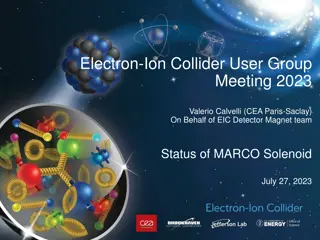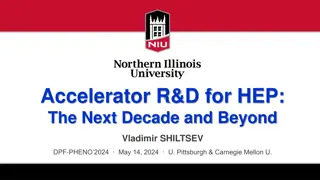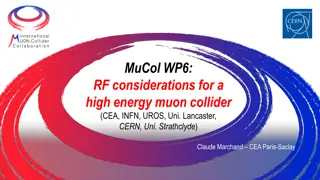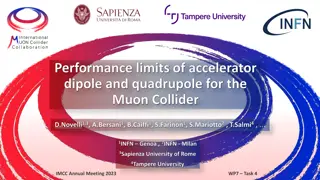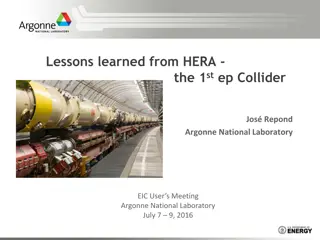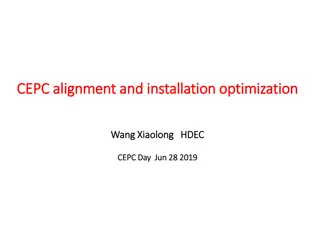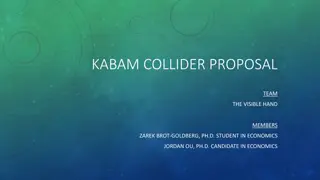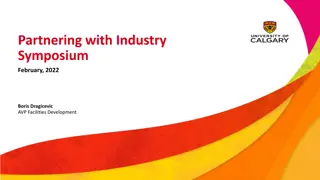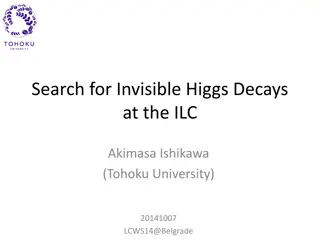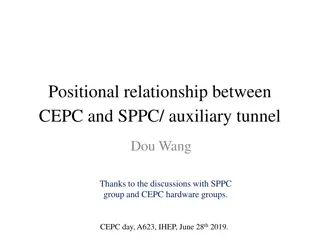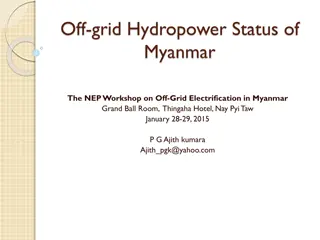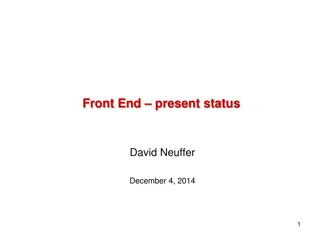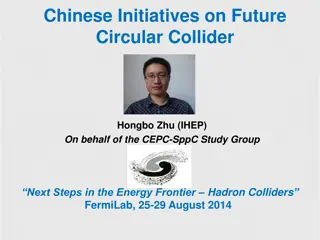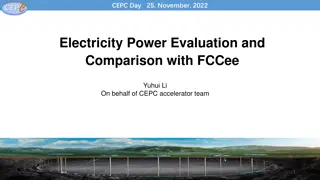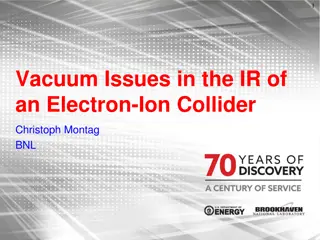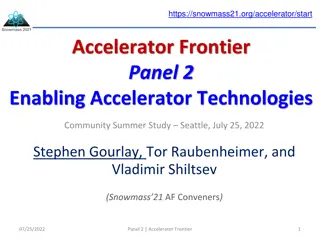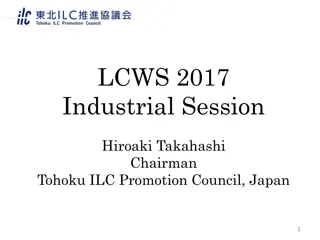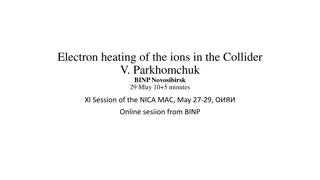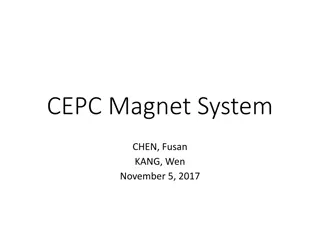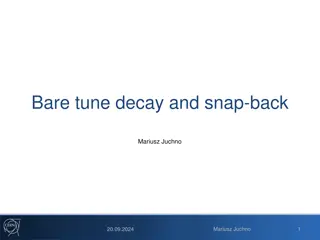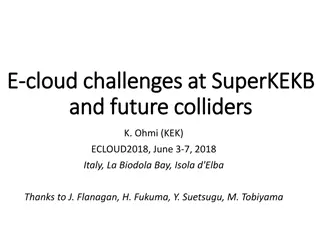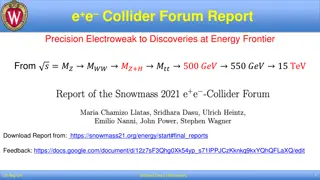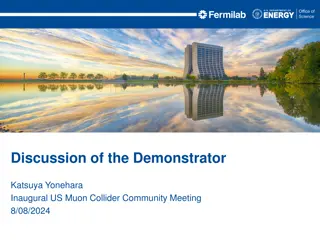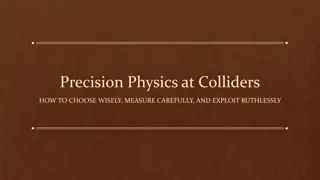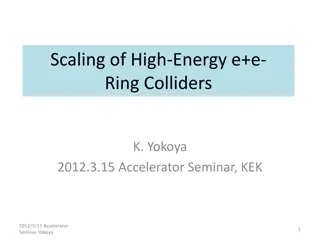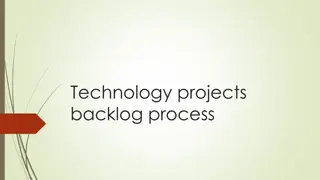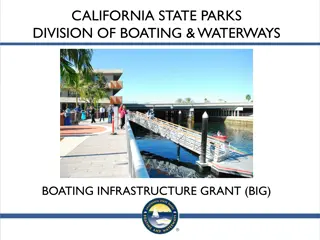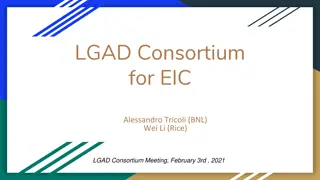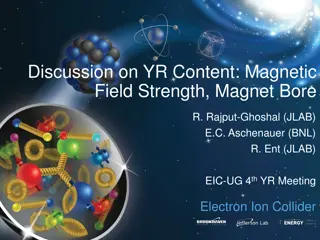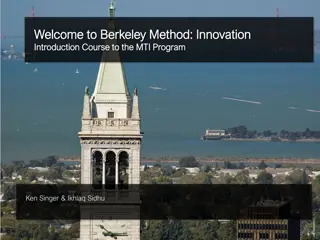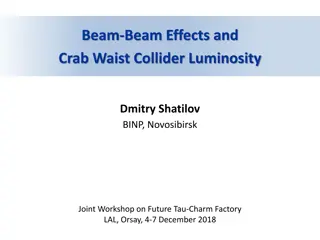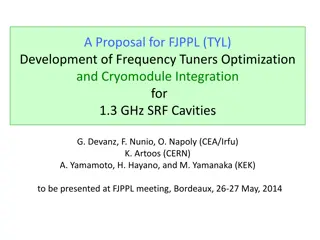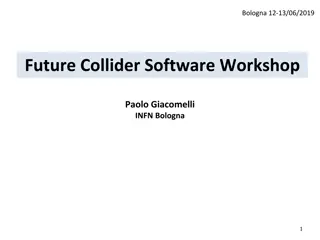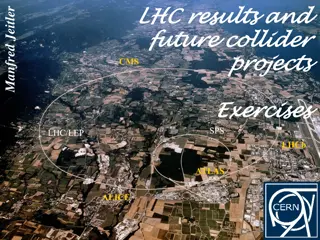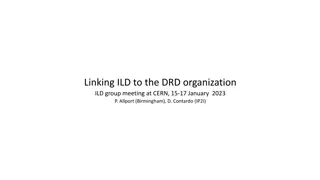High-Energy Recycling in E+ E- Colliders: Energy Recovery Linacs (ERLs) Advancements
High-energy recycling in E+ E- colliders involves the innovative concept of Energy Recovery Linacs (ERLs), pioneered by experts like Vladimir N. Litvinenko. These ERLs effectively recycle energy from collided beams, reducing energy consumption and increasing collider efficiency by maximizing luminos
1 views • 21 slides
Update on MARCO Solenoid Magnet Design for Electron-Ion Collider User Group Meeting 2023
Valerio Calvelli from CEA Paris-Saclay presented the status of the MARCO Solenoid magnet for the Electron-Ion Collider User Group Meeting 2023. The presentation covered an overview of the detector solenoid, magnet specifications, design status, cold mass details, and interaction length limits, provi
0 views • 21 slides
PROGRAMME 3. PROGRESS ON COMMUNITY AND MAINTENANCE PROJECTS (AS AT 29 FEBRUARY 2024) AS REFLECTED IN THE ANNUAL PERFORMANCE PLAN.
An update on the progress of various infrastructure projects in the Annual Performance Plan is provided, covering categories such as Community-Based Tourism Projects, Maintenance of Provincial Tourism Assets, and Tourism Infrastructure Projects. The report includes details on the implementation stat
2 views • 17 slides
Accelerator R&D for High-Energy Physics: Advancements and Future Prospects
Vladimir Shiltsev's presentation at DPF-PHENO 2024 discusses the evolution of accelerator R&D in high-energy physics, emphasizing the need for off-shore Higgs factories and targeted collider developments. The P5 recommendations underscore the importance of engaging in feasibility studies for advance
0 views • 28 slides
RF Considerations for High-Energy Muon Collider
This work package focuses on assessing feasibility issues and technological challenges of RF systems for a high-energy muon collider. Tasks include defining RF systems for acceleration and cooling complexes, addressing high gradients, beam loading, breakdown mitigation, and optimizing cavity distrib
0 views • 11 slides
Performance Limits of Accelerator Dipole and Quadrupole for Muon Collider
Utilizing Python code, the study analyzes the limits of accelerator dipole and quadrupole for the Muon Collider. Analytic formulas are implemented to assess the behavior of these components based on critical current density, operating temperatures, and superconductor materials. The study explores li
0 views • 17 slides
Insights from HERA Collider Experiments and Acronyms
Lessons learned from the HERA collider regarding its operation, detectors, experiments, and challenges faced. Acronyms like HERA, H1, ZEUS are explained, along with details on beam collisions and detectors used. Personal insights and caveats shared by a researcher who was involved in the HERA projec
0 views • 20 slides
Tasks of Alignment and Installation in CEPC Project
Tasks involved in the alignment and installation optimization of components in the Circular Electron Positron Collider (CEPC) project include control network construction, component installation, smooth alignment, and addressing any arising problems. The process is crucial for the successful operati
2 views • 19 slides
Optimizing In-Game Currency Prices for Greater Revenue: A Proposal by Kabam Collider Team
The Kabam Collider team aims to tackle Apple's pricing restrictions by implementing region-specific sales strategies and conducting A/B testing to estimate demand. They suggest adjusting in-game item prices instead of exchange rates, emphasizing revenue maximization through optimal pricing strategie
0 views • 21 slides
Industry Symposium Highlights and Project Specifics for 2022
The Partnering with Industry Symposium in February 2022 presented valuable insights into major capital projects like the Interdisciplinary Science and Innovation Centre (ISIC), Capital Maintenance, Utility Reduction Programs, and Minor Institutional Projects. Specifics of projects such as ISIC's 9,5
0 views • 8 slides
Exploring Invisible Higgs Decays: Insights from ILC and LHC
Investigating invisible Higgs decays plays a crucial role in unveiling potential signals of new physics, like Dark Sectors or Dark Matter. The search for invisible Higgs decays at the International Linear Collider (ILC) and the Large Hadron Collider (LHC) involves unique techniques such as recoil ma
0 views • 18 slides
Positional Relationship Between CEPC and SPPC for Accelerator Physics
The positional relationship between the Circular Electron-Positron Collider (CEPC) and the Super Proton-Proton Collider (SPPC) involves careful considerations such as bypass tunnels, compatibility for future e-P collision programs, and shielding in the tunnel. Various scenarios are discussed regardi
0 views • 8 slides
Overview of Off-Grid Hydropower Status in Myanmar
The NEP workshop on Off-Grid Electrification in Myanmar held in Nay Pyi Taw in 2015 shed light on various off-grid hydropower projects in different states of Myanmar. The projects range from small-scale individual setups to larger community-based initiatives, showcasing a mix of private, government-
1 views • 44 slides
Current Status of Front End Systems in Particle Collider Research
David Neuffer presented the current status of front end systems for particle colliders on December 4, 2014. The presentation covered various aspects like baseline examples, beam characteristics, drift mechanisms, cooling methods, and simulation results. It provided insights into the operational mech
0 views • 15 slides
Advancements in Chinese High-Energy Physics Research
Initiatives like the CEPC-SppC Study Group and Circular Electron Positron Collider (CEPC) showcase China's commitment to pioneering future collider projects. With a focus on the energy frontier, developments such as the upgrade to a 50-70 TeV pp collider indicate significant progress in the field. T
0 views • 32 slides
Comparison of Electricity Power Systems Between CEPC and FCCee
The evaluation and comparison of electricity power systems between the CEPC and FCCee accelerators reveal the power breakdowns, RF power consumption, magnet power supply, and overall power usage. Differences in power consumption for various components such as RF, magnets, and vacuum systems are high
0 views • 19 slides
Challenges and Upgrades in Electron-Ion Collider Interaction Regions
The article discusses vacuum issues, design challenges, and experiences in the interaction regions of Electron-Ion Colliders. It explores the unique characteristics of the HERA collider, including beam currents, bunch spacing, and straight sections. Additionally, it covers the upgrades and improveme
0 views • 25 slides
Future of Accelerator Technologies: Enhancing Colliders and R&D Programs
The Accelerator Frontier Panel discusses the crucial components to enable future accelerators, emphasizing the need for a National Future Collider R&D Program, General Accelerator R&D, and adequate accelerator and test facilities. The message stresses the importance of an integrated future collider
0 views • 17 slides
Initiatives for the International Linear Collider (ILC) in Japan
The Tohoku ILC Promotion Council, established in 2009, aims to bring the ILC to Japan with support from various sectors. The recent re-election of key executives and ongoing projects signify Japan's strong commitment to hosting the ILC. Activities by the Tohoku ILC Planning Office and interest from
2 views • 10 slides
Ion Beam Intensity Enhancement Through Electron Heating in Collider Experiments
The study discusses electron heating of ions in collider experiments at the Collider V. ParkhomchukBINP facility in Novosibirsk. It explores the effects of electron cooling on ion beams, ion beam oscillations, losses, and ion beam intensity enhancement. Various factors such as ion charge, classical
0 views • 9 slides
Fusion Science Department Enabling Research Projects 2021-2023
The Fusion Science Department Enabling Research Projects for 2021-2023 focus on developing novel fusion-relevant scientific and technological ideas. These projects, led by Principal Investigators, are distinct from main work packages and involve scientific planning, team collaboration, and resource
0 views • 11 slides
CEPC Collider Magnet System Overview
The CEPC collider magnet system comprises dual aperture dipole, dual aperture quadrupole, sextupole, and booster magnet designs. These magnets cover a significant portion of the 100km ring, addressing considerations such as manufacturing cost, power consumption, and field quality. The design focuses
1 views • 24 slides
Analysis of Tune Variation and Decay in Large Hadron Collider
This analysis focuses on the tune variation and decay of the bare machine tune in the Large Hadron Collider. It covers the evolution of the bare tune, analysis of the tune decay after injection, fitting of decay constants, and data extraction from 2015. The study includes insights into beam commissi
0 views • 16 slides
SuperKEKB: Advancements in Electron-Positron Collider Technology
SuperKEKB is a cutting-edge circular collider facility that aims to push the boundaries of high-energy physics research. From addressing cloud challenges to conducting instability simulations, the facility has made significant strides in understanding beam dynamics and electron cloud effects. The co
0 views • 32 slides
Advancements in High-Energy Collider Technology and Discoveries
Explore the latest developments in collider technology, focusing on precision electroweak measurements and discoveries at the energy frontier. Reports highlight advancements in circular colliders, linear colliders, and the status of machine designs and risks. Key topics include luminosity, energy re
0 views • 19 slides
Developments in Muon Collider Technology at the Inaugural US Muon Collider Community Meeting
Discussion at the US Muon Collider Community Meeting highlighted advancements in muon accelerator technology, with a focus on the Demonstrator by Katsuya Yonehara. Key topics included the layout of the muon accelerator complex, achievements in ionization cooling, and the MERcury Intense Target. The
0 views • 14 slides
Precision Physics at Colliders: Choosing Wisely, Measuring Carefully, and Exploiting Ruthlessly
Precision Physics at Colliders explores the selection, measurement, and utilization of data at colliders, focusing on fundamental symmetries and parameters of the Standard Model. The lectures cover topics such as QCD, top, electroweak, and flavor physics, emphasizing the importance of precision meas
0 views • 42 slides
Scaling of High-Energy e+e- Ring Colliders and Proposed Parameters
Scaling of high-energy e+e- ring colliders has been proposed for energy levels exceeding 200GeV by various authors. The suggested collider possibilities include different tunnel configurations and collider designs. Common features for reducing synchrotron radiation include large circumferences and l
0 views • 15 slides
Analysis of Technology Projects Backlog Process and Project Trends
This detailed report examines the technology projects backlog process, project trends, and analysis of completed projects within the past year. It delves into metrics such as active projects, completed projects, new projects, and the ratio of incoming requests to completed projects. Additionally, it
0 views • 4 slides
Boating Infrastructure Grant Program in California
The Boating Infrastructure Grant (BIG) Program by the California State Parks Division of Boating & Waterways aims to provide funding for boating-related projects. From Tier I projects with grants up to $200,000 to Tier II projects up to $1.5 million, the program supports various activities like tie-
0 views • 9 slides
LGAD Consortium for EIC: Advancing Detector Technologies
The LGAD Consortium aims to foster the development of detector technologies based on LGAD sensors for the Electron-Ion Collider (EIC) and future projects. By creating a collaborative effort, sharing expertise, and bringing together those interested in LGAD-based detectors, the consortium seeks to ad
0 views • 9 slides
Insights on Magnetic Field Strength for Electron Ion Collider
Discussion on the requirements and advantages of different magnetic field strengths in detector solenoids at the Electron Ion Collider, emphasizing the impact on particle tracking, momentum resolution, and detector space needs. The analysis compares 1.5T and 3T fields, highlighting the implications
0 views • 9 slides
Exploring Innovation Through the Berkeley Method: Insights and Frameworks
Delve into the world of innovation with the Berkeley Method, focusing on preparing students for diverse innovation opportunities in the new economy. The program, led by Ken Singer and Ikhlaq Sidhu, introduces the MTI program and the Innovation Collider Model at UC Berkeley. Explore the Innovation Co
1 views • 9 slides
Advanced Techniques in Collider Physics for Enhanced Luminosity
Explore cutting-edge research on beam-beam effects, crab waist colliders, and luminosity optimization in collider physics. Discover how innovative strategies like crab waist technology and bunch crabbing mitigation are revolutionizing particle collision studies. Dive into the complexities of achievi
0 views • 10 slides
Indian Housing Block Grant 2023 Competitive Priorities
The Fiscal Year 2023 Indian Housing Block Grant (IHBG) Competitive NOFO Training focuses on Soundness of Approach with a maximum of 42 points. Subfactor 3.1 emphasizes IHBG Competitive Priorities, including new housing construction projects, housing rehabilitation projects, acquisition of units, and
0 views • 23 slides
Development of Frequency Tuners Optimization for SRF Cavities
Frequency tuners are crucial for adjusting the fundamental frequency of superconducting RF cavities to counteract detuning effects. The proposal discusses the importance of tuners, their operational mechanisms, and the challenges in achieving high reliability for efficient cavity operation. Various
0 views • 14 slides
Future Collider Software Workshop in Bologna
Hosted in Bologna, the Future Collider Software Workshop aims to discuss the need for a common software framework across different experiments at future colliders. The workshop addresses the challenges of adapting to new processors and detector geometries and explores the possibility of a common eve
0 views • 5 slides
Unraveling Collider Physics: Investigations, Interpretations, and Accelerations
Dive into the world of collider physics with a focus on LHC results, future collider projects, and experiments from the Baikal Summer School 2021. Explore topics like invariant mass calculations, Higgs boson decays, particle acceleration in the LHC tunnel, and particle velocity considerations. Engag
0 views • 10 slides
Strategic Projects Alignment and Timelines Overview for DRD Collaboration at CERN
General considerations and key work packages linking ILD to the DRD organization, outlining the current assumptions on collider project timelines, typical technical and approval steps, and broad brush timelines for DRD collider projects. The content also highlights the DRD collaboration objectives a
0 views • 11 slides
EuroTeQ Collider 2022 and Circular Business Models
EuroTeQ Collider 2022 addresses challenges in the medical imaging industry, specifically for Siemens Healthineers, focusing on circular business models. The event discusses the current linear business model, three modules to circularity, and solutions for implementing economically feasible and susta
0 views • 8 slides

